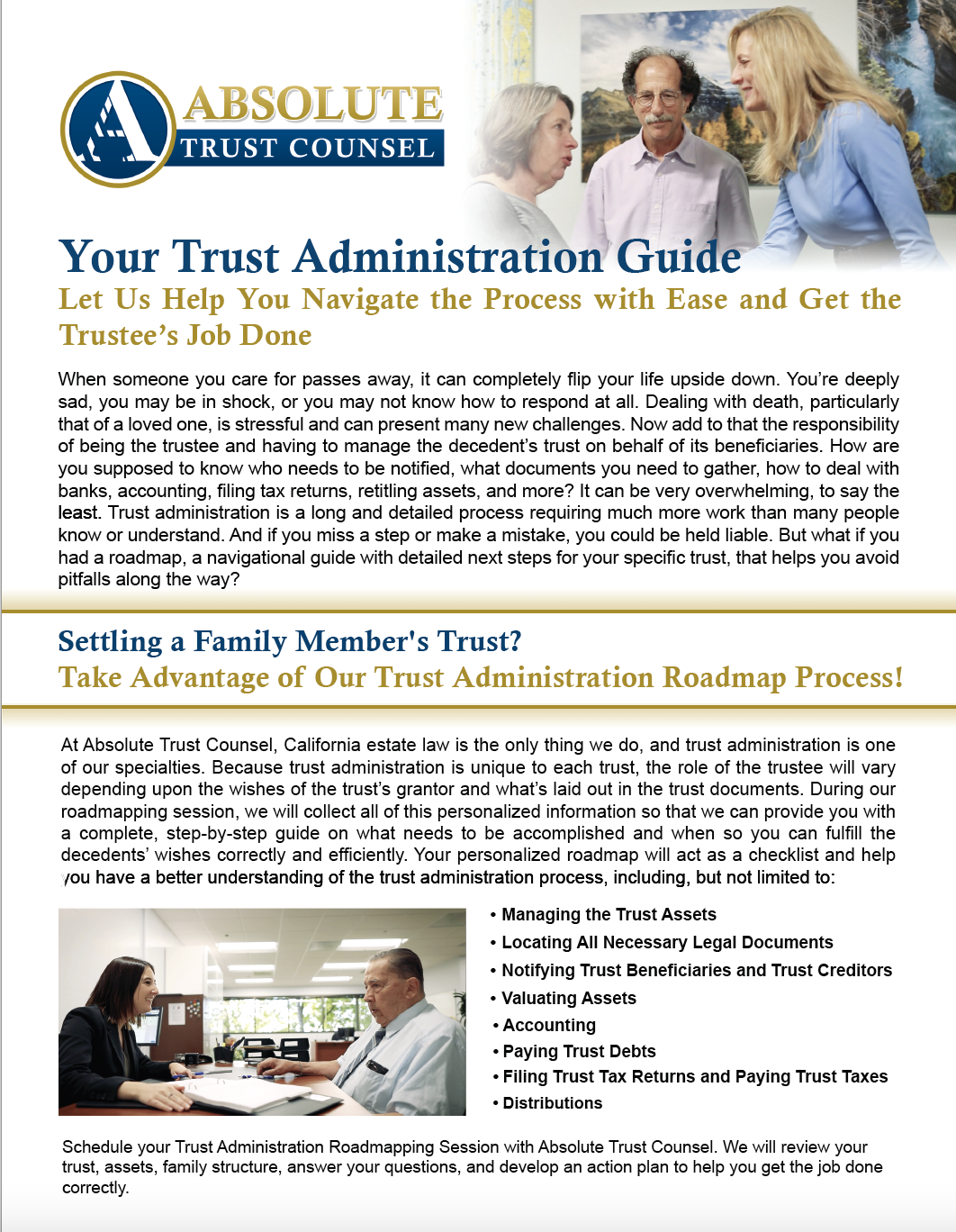When MaryAnne’s father died, she was quite surprised to learn that she had been named trustee of the family trust. After all, her brother, Daniel, was a banker, and her sister, Katy, was a lawyer. She was a wife and mother with an unused elementary education degree.
“Why would Dad name me trustee?” MaryAnne asked. “I have no qualifications. Heck, I wouldn’t know a trust from a greeting card. Both of you are better qualified than me. This simply makes no sense.”

“Perhaps Dad felt you had the time to devote to the administration of the trust and could rely on us to answer any questions you had,” Katy suggested. “And let’s face it,” said Daniel. “MaryAnne was always Dad’s favorite. He trusted her. I am not sure he always trusted us.” MaryAnne wrung her hands. “But I just started working as a substitute teacher,” she said. “We need the money with the kids headed off to college and all. We were relying on my income.”
“Well, you do get paid as a trustee.” Katy said. “Perhaps the fee will be sufficient to cover your lost income. It’s not a full-time job, you can still work sometimes, Just keep track of your hours and everything you do, and together we can decide what is reasonable.” MaryAnne’s eyes narrowed. “Unfortunately, what may be reasonable to me may not be reasonable to you. I have a big learning curve here. Maybe I should just hire a professional. After all, the trust will pay for that.”
“Oh, don’t do that,” Daniel said. “They charge incredibly high fees and that will impact our income from the trust. Surely we can decide on an hourly rate that everyone thinks is reasonable.” “I’m not sure if that’s a good idea,” MaryAnne replied. “I am going to have to think about this. You two are always trying to interfere with everything I do, questioning every financial decision I make. This will be no different. You both stick your noses into everything. You can’t help yourselves.”
The selection of a trustee is one of the most difficult decisions a grantor must make. On the one hand, selecting a trusted family member to serve as trustee can mean no trustee fees, if the trustee agrees to waive their right to be compensated. On the other hand, in volatile family situations, a family member could be subjected to the abuse and wrath of other family members, making trust administration exceptionally difficult. The appointment of a third-party or professional trustee may involve a higher fee, but assures that family politics does not interfere with trust administration. In addition, in situations involving a complex trust, a professional trustee may be better qualified to administer the trust.
Generally, a trustee has the duty to administer a trust in accordance with the instructions set forth in the trust document. Those duties may include monitoring investments, managing the sale and acquisition of assets, paying taxes, making distributions to beneficiaries, complying with reporting and accounting requirements, and responding to beneficiary requests for information. For simple trusts, these can be simple tasks involving very little time. For complex trusts, however, a more significant time commitment may be involved.
Under California law, if a trust does not specifically state a fee for trust administration, a trustee is entitled to “reasonable compensation.” That fee may be set by a probate court or the trustee with the approval of the beneficiaries. In addition, if a trust provides for inappropriate compensation, such as fees that are too low or too high, a probate court may order a fee adjustment. However, trustees are entitled to compensation only for the services they actually provide. Even though trustees do not need probate court approval to take a fee, they must account for those fees to trust beneficiaries.
A court may consider eight factors when determining whether trustee compensation is reasonable, including the gross income of the trust, the success or failure of trust administration, the fidelity (loyalty) of the trustee, the risk and responsibility assumed by the trustee, the actual time spent administering the trust, customary fees in the community, whether the work performed was routine, and the trustee’s skill, expertise or experience.
The trustee’s fee is considered taxable income. For that reason, a trustee who is also a beneficiary under the trust may choose to waive payment of a trust administration fee. An inheritance passed on through a trust is generally tax-free. In addition, by waiving a fee, more resources remain in the trust, gaining interest or otherwise accumulating value.
When it comes to trust administration, documentation of hours spent on trust-related duties, complete descriptions of tasks performed, and receipts for administrative expenses are especially important. Therefore, the question concerning the appointment of a trustee should not be who will provide services at the lowest fee, but who will best ensure the trust is administered fairly and in accordance with the grantor’s instructions.
Your Trust Administration Guide
Let Us Help You Navigate the Process with Ease and Get the Trustee’s Job Done

Trust administration is a long and detailed process requiring much more work than many people know or understand. And if you miss a step or make a mistake, you could be held liable. Download a copy of our Trust Administration Flyer for more information on our roadmapping session and how to get started.
[Ad] The job of a trustee isn’t as easy as one may think. You must give legal notices, retitle assets, file tax returns, understand a legal document, and perform a variety of tasks most people find unfamiliar. As a trustee, if you forget a step or make a mistake, you could be held liable.
Protect yourself, have a plan, and find out the next steps about your specific trust. Get started now by scheduling a 20-minute discovery call with Absolute Trust Counsel. During this introductory call, we will gather information about your trust administration, review our trust administration process with you, and answer any questions you may have. Our goal is to help you get the job done right!

